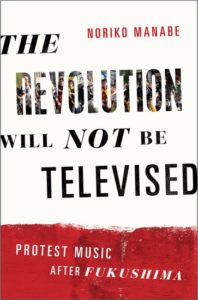The Revolution Will Not Be Televised: Protest Music After Fukushima by Noriko Manabe [Book Review]
The Revolution Will Not Be Televised, by Princeton University Professor Noriko Manabe, is a detailed study of protest music in Japan’s anti-nuclear movement. Manabe’s goal is not to explain the growth of these songs in the movement, but rather to use the Japanese case to examine how protest music is performed and how different performance venues—music festivals, protests, and cyberspace—can affect how music is interpreted. Thus,Revolution should be read by those interested in deep analysis of protest music on its own terms, rather than those interested in the anti-nuclear movement in general.
Notwithstanding its more academic focus, Revolution does discuss some of the constraints faced by Japanese musicians. Manabe writes that, despite having “the second-largest music market in the world, with an extensive underground music scene representing a dazzling array of genres,” explicitly political musicians are rare. When Japanese musicians have made overtly political statements, they have often suffered an intense public backlash. The music industry also encourages self-censorship. Japanese record companies are concerned that if songs explicitly mention individual people, they may be liable under libel and slander laws. It is not for nothing that the Recording Industry Association of Japan has an internal board that evaluates whether songs are fit for distribution: the “Recording Industry Ethics Regulatory Commission”, or Recorin.
This is an excerpt from a book review of The Revolution Will Not Be Televised: Protest Music After Fukushima published in the Asian Review of Books on April 5th, 2016. The review can be found here.

Recent Comments